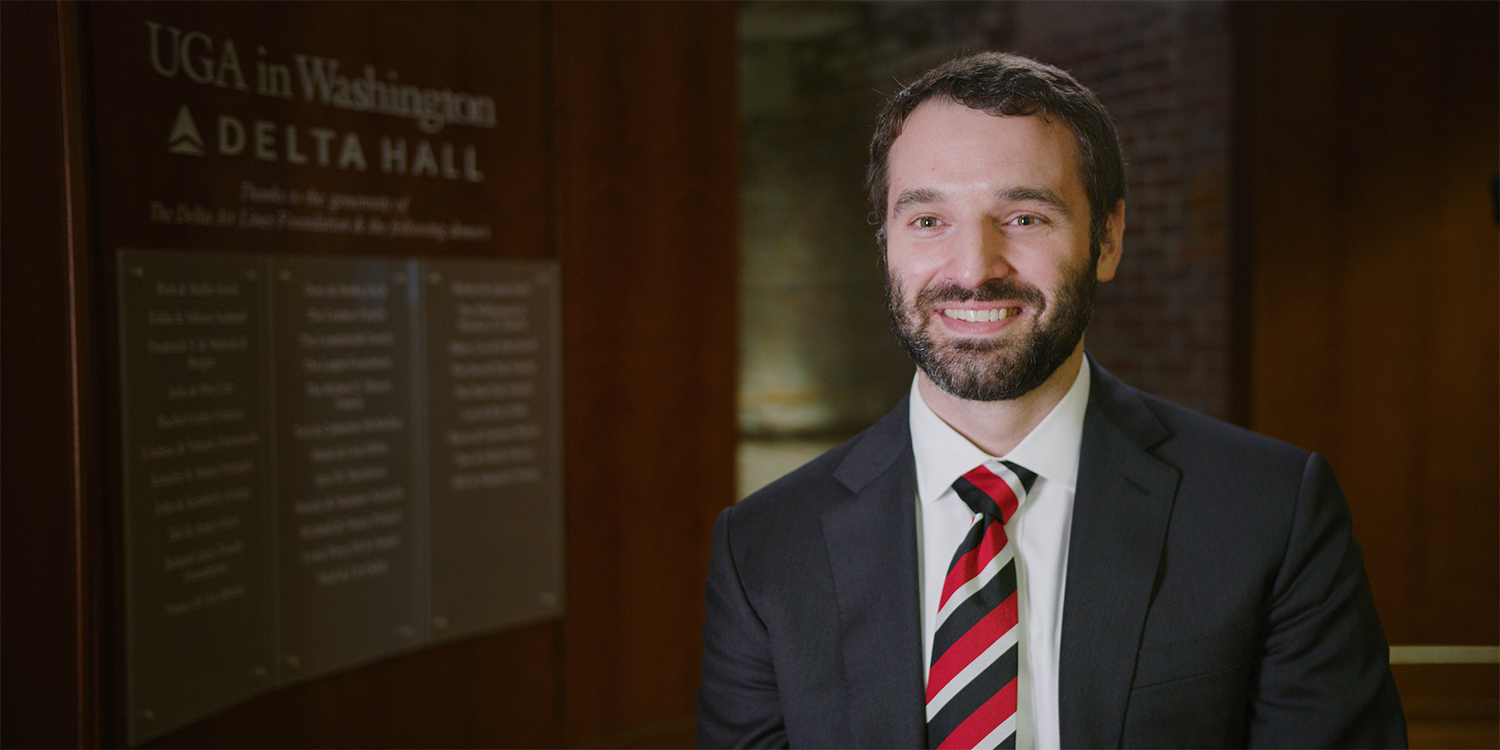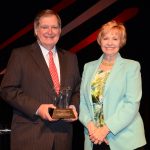Latham Saddler had it all figured out.
Fresh off a collegiate career defined by leadership and academic excellence, he secured a select job as an IBM professional sales specialist in New York City. But ever since that September day in 2001, when he watched the Twin Towers collapse on TV in his Russell Hall dorm room, nothing outweighed his desire to serve his country.
So Saddler hatched a plan — he would work a couple of years in New York, get in the best shape of his life, seek placement in the Navy’s Officer Candidate School and report to SEAL selection and training.
It was a simple, straight-forward plan.
Until it wasn’t.
“I met a retired SEAL mentoring guys in the Manhattan area who wanted to join the Navy and become SEALs, and he told me to print my résumé and he’d let me know what my odds were. I brought in my résumé and he said ‘You don’t have a chance,’ ” Saddler says, laughing at the memory. “He said ‘look, you’re competing with guys that have PhDs, graduate degrees. I’ve had Rhodes Scholars come through here, Olympic medalists in swimming, D-I athletes, guys that were captains of their athletic teams at Ivy League schools. For you, it’s not gonna happen.’
“I tell people it was the biggest helping of humble pie I have ever had,” he adds. “It was also the best feedback I ever received because it re-framed the challenge ahead.”
The challenge — which would include earning two masters’ degrees, learning to speak Farsi, living a year in Tajikistan, interning at the FBI, and endless laps in the pool — took six years with no guarantee of meeting his aspirant goal. But as is evident throughout Saddler’s life, hard-work and perseverance manage to supplant overwhelming odds and the fear of failure.
“Latham is by nature one of those people that when opportunity comes by, he instinctively grabs it,” says Earl Leonard, a Terry College Executive in Residence who mentored Saddler while he was a Leonard Leadership Scholar. “He does not think about it, he does not wait until tomorrow, he grabs it then and there. … He wanted to combine a lot of different goals within his ambitions and within the things he wanted to do. That’s the type of person he is and was.”
After eight years of service as a Navy SEAL officer, Saddler has transitioned from active duty and working at the National Security Council to being in the 2018-19 White House Fellows program, where he receives “first-hand experience in the process of governing.”
Saddler is one of 14 Fellows (more than 1,000 apply for the program each year) and was tasked with working in offices concerned with prison reform as well as economic initiatives and entrepreneurship. He was part of the team that worked on the FIRST STEP Act, a bipartisan bill signed into law in December which reforms the federal prison system by, among other things, reducing mandatory minimum sentences and allowing inmates to participate in more vocational and rehabilitative programs.
“I wanted to get out of my comfort zone with national security for a year and still serve at the highest level of government, hopefully to bring a different perspective to the table and contribute,” Saddler says. “I’ve been working on prison reform and workforce development, two areas I didn’t know anything about, which is exactly what I wanted from the fellowship.”
His wife Melissa (ABJ ’06), who he first met at UGA but didn’t fully connect with until years later, says the “nice, awesome guy” she met in college has become a caring man of deep integrity.
“I still sit down every day in awe of what he’s done and what he continues to do,” Melissa says. “He is really good at connecting with people, that’s one of his best qualities across the board. He’s smart and dedicated, and then he’s humble about it all. He is the last one to talk about his accomplishments, even though he’s so proud of what he’s been able to achieve.”
His accomplishments and achievements are indeed many.
As a Georgia native, Saddler returned to Georgia from Charlotte, N.C., where in high school he was captain of the soccer team and class president. His sister Lauren (ABJ ’02) was attending UGA during Saddler’s senior year and implored her younger brother (who was leaning toward Florida State) to visit and see what Athens had to offer. “As soon as I got down there, I was sold,” he says. “I thought, I’m going to dive in at UGA and continue to grow as a leader.”
Dove in he did. An economics major at the Terry College, Saddler was a Leonard Leadership Scholar, Student Government Association president, Interfraternity Council president, a member of Phi Gamma Delta fraternity, Blue Key Honor Society, Gridiron, Sphinx and the Order of the Greek Horsemen.
He was also homecoming king, an event which introduced the UGA community to Saddler’s biggest influence and supporter — his twin brother Ashby.
The year before, Ashby, who was born with Down syndrome, was named the homecoming king of his North Carolina high school. His twin drove up from UGA to see the crowning, only to watch as Ashby took the crown off his head and place it on Latham’s. “This is for you,” Ashby told his brother.
When it was Latham’s turn to be crowned, he returned the favor — on the sidelines of a sold-out Sanford Stadium.
“Ashby has had the biggest impact on me out of any person I know,” Saddler says. “I have learned more from him because he doesn’t worry about the things that we tend to worry about on a daily basis. I’ve had this very interesting pathway up to this point in my life but he has kept me grounded.”
“He’s the best brother anyone could have,” Ashby says. “I’m proud he’s my brother.”
While Saddler is quick to talk about his time at UGA, his family, and work with the White House Fellows, he’s politely reticent to talk about his years as a SEAL-team member. He served on both the East and West Coast SEAL teams, deploying to Iraq, Afghanistan and other undisclosed locations, where he put his master’s in international affairs from Georgia Tech and master’s in Persian Studies from the University of Maryland to good use. A fluent Persian-Farsi and Dari speaker, Saddler said his ability to communicate with people on the ground was important to the mission, and his maturity as one of the older “team guys, as we call each other,” allowed him to display the necessary leadership to carry out his role effectively.
“To be a part of that community will be the biggest professional honor of my life,” Saddler says. “And then to also have the opportunity to lead is incredible. I don’t know any other type of leadership that is like it. Having the life experiences I had, given my late start in the military, I would say attributed to a career I can look back on and be proud of.”
Leonard sees Saddler’s ascent to the SEALs as a culmination of his leadership training.
“When you graduate from the Navy SEAL program, you have been through one of the toughest, most difficult and straining exercises that any military in the world can offer,” he says. “The Navy SEALS are a special lot, to say the least, it is the essence of leadership, it’s what leadership is all about and that is the Latham Saddler that I know.”
It has been a thrilling and bustling life for Saddler, but the pace is different now. A recent January morning in his Washington, D.C., home saw him alternating between cooking breakfast (“we start most days with bacon and eggs,” Melissa says) and sitting with his 2-year-old son Bubba, playing with toy trucks and military planes. Becoming a father has refocused some of his energies and “shows the soft side of him,” Melissa says.
When his fellowship ends this summer, Saddler is not sure where he, Melissa and Bubba will go next. It could be anywhere considering what he’s done to this point, though his focus remains squarely on the immediate task of serving his country, as he’s done for decades.
“Latham believes in the mission and a call to serve,” Melissa says. “He told me at the end of every day he stops and looks at the White House and the American flag above it and takes a moment to pause. He is able amidst everything to keep himself so grounded, and let his faith drive him.”




